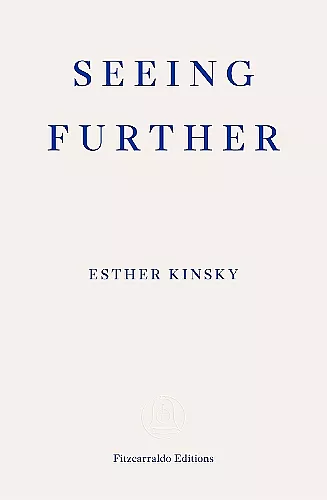Seeing Further
Esther Kinsky author Caroline Schmidt translator
Format:Paperback
Publisher:Fitzcarraldo Editions
Published:29th Aug '24
Should be back in stock very soon

While travelling through the Great Alföld, the vast plain in south-eastern Hungary, Esther Kinsky stops in a small town near the Romanian border. Like many other things, the cinema, ‘mozi’ in Hungarian, has long since closed. Entranced by the decaying mozi, she soon embarks on the colossal task of reviving it, compelled by the irresistible magic of the cinema, a site rooted in ritual that is steadily disappearing. Beautifully translated by Caroline Schmidt, Seeing Further is a powerfully eloquent declaration of love to the cinema and the collective experience of watching by Esther Kinsky, one of Germany’s most important contemporary writers.
‘The narrator’s own reminiscences of the last century, “the cinema century,” unfurl a vast cultural memory of moviegoing as a lost form of community, even shelter-taking…. The cinema produces a kind of magic, which we might call the magic of the frame. And Seeing Further, in line after gorgeously elaborated line, tracks the struggle to produce that magic for oneself.’
— Ben Libman, New York Times
‘Kinsky has been interested in looking throughout her career; she takes photographs, writes about photographs, and deploys a photographic literary style. In her latest brilliant novel, Kinsky addresses the topic head-on. The tale of a woman’s attempts to reopen the shuttered cinema, or Mozi, of a remote Hungarian town is interwoven with bittersweet stories about the town’s inhabitants and moody old photographs. Kinsky also reflects on the cinema as a “place of wonder” and a shared cultural institution – one that lets us see beyond the grubby individualism of everyday life…. Her case for the Kino is softly spoken, yet profound.’
— Alexander Wells, The Berliner
‘Kinsky scatters stories into ruminative essays, and a delightful fictional interlude runs up against photography’s grave claims to actuality. She writes in the first person but has, nonetheless, capacious attention for what various townspeople think of bringing the old mozi back to life…. Cinema can affect our perception; it can be an education in looking, and looking well. Proof of that is in the prose here. Coloured by art cinema, Kinsky’s eyes look well at the world, with patient yet lively curiosity.’
— Laura Staab, Sight and Sound
‘Esther Kinsky has created a literary oeuvre of impressive stylistic brilliance, thematic diversity and stubborn originality.’
— Kleist Prize jury
‘Esther Kinsky has more eyes than most; in her novel Rombo she evokes the entire life of an Italian village before, during, and after the two devastating earthquakes of 1976, but each plant and animal central to the village is also a character, and the most important character of all is the landscape itself. The book becomes as much about the futures as the past, for our natural disasters are increasingly man-made, and we need more than ever this reminder of universal impermanence and the marks of memory we leave in its wake.’
— Mary Ruefle, author of Madness, Rack, and Honey (praise for Rombo)
‘A tragic travelogue to the underworld-turned-world that recasts a newly lost Italian past with a climate-wise chorus straight out of the most harrowing Greek drama.’
— Joshua Cohen, author of The Netanyahus (praise for Rombo)
‘In Esther Kinsky’s new novel, language becomes the highest form of compassion and solidarity – not only with us human beings, but with the whole world, organic, non-organic, speaking out with many mouths and living voices. A miracle of a book; should be shining when it gets dark.’
— Maria Stepanova, author of In Memory of Memory (praise for Rombo)
Esther Kinsky grew up by the river Rhine and lived in London for twelve years. She is the author of six volumes of poetry, five novels (Summer Resort, Banatsko, River, Grove, Rombo), numerous essays on language, poetry and translation and three children’s books. She has translated many notable English (John Clare, Henry David Thoreau, Iain Sinclair) and Polish (Joanna Bator, Miron Białoszewski, Magdalena Tulli) authors into German. Both River and Grove won numerous literary prizes in Germany. Seeing Further is her fourth book published by Fitzcarraldo Editions.
Caroline Schmidt was born in Princeton. She translated Esther Kinsky’s novels Rombo and Grove, which was shortlisted for the Oxford-Weidenfeld Prize, and has translated poetry by Friederike Mayröcker, and art historical essays, museum catalogues and exhibition texts for Albertina in Vienna and Pinakothek der Moderne in Munich, among others. She lives in Berlin.
ISBN: 9781804271162
Dimensions: unknown
Weight: unknown
224 pages